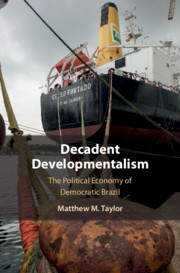Book contents
1 - Introduction
Published online by Cambridge University Press: 04 November 2020
Summary
Between 1985 and 2018, Brazilian economic well-being stagnated, with lackluster growth and regressive public policies destroying citizens’ life opportunities. There is considerable consensus about the sources of this low-level economic equilibrium, including low savings, low investment, and modest human capital improvements. Despite this consensus, and despite decades of reform, however, the overall institutional equilibrium changed only marginally. Drawing on the study of varieties of capitalism, this chapter describes how institutional complementarities drove actors’ incentives toward a collectively suboptimal equilibrium. Complementarities within and across five domains sustained the equilibrium: 1) the macroeconomy of a middle-income developmental state, 2) the microeconomy of firm organization; 3) the coalitional presidential political system; 4) the weak control mechanisms this political system set in place; and 5) an autonomous bureaucracy that permitted incremental reform but in consequence, may have moderated demands for more dramatic reforms while deepening fiscal constraints and impelling policymakers to preserve the tool kit of the developmental state.
Keywords
Information
- Type
- Chapter
- Information
- Decadent DevelopmentalismThe Political Economy of Democratic Brazil, pp. 1 - 32Publisher: Cambridge University PressPrint publication year: 2020
